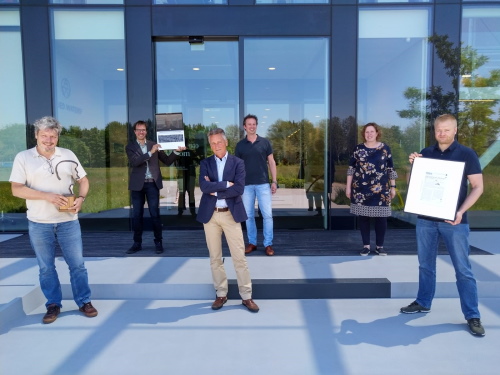The Willem Koerselman Prize was awarded on 10 June, underlining the social significance of KWR sewage-water research in the fight against the SARS-CoV-2 virus. The paper on this research that was published in the early days of the pandemic was cited 49 times in 2020 alone. ‘Because KWR already has a great deal of knowledge about sewage-water research, we were in a position to move quickly,’ according to the leading author Gertjan Medema.
Every year, the Willem Koerselman Prize is awarded to the KWR researcher(s) with the most cited peer-reviewed article of that year. The award therefore emphasises the impact of the research and maintains a tradition that KWR has nurtured since 2009. Willem Koerselman, who gave his name to the prize, published the article ‘The vegetation N:P ratio: A new tool to detect the nature of nutrient limitation’ in the Journal of Applied Ecology in 1996 with Arthur Meuleman. With almost 1,500 citations to date, this publication is at the top of the KWR’s rankings. At the time, that was the reason for the prize.
Social relevance
During the presentation of the prize, Ruud Bartholomeus, the Chief Science Officer at KWR, briefly reviewed the situation with respect to publications during the past year. For example, he noted that KWR is increasingly publishing in open access journals. That is raising the profile of our research. Bartholomeus: ‘Of course, it’s not just a question of citations. What is important above all is that our work should contribute to society, the impact-driven research of our government, the European Green Deal and the Sustainable Development Goals of the United Nations. As far as that is concerned, we have a wonderful winner this year.’
Powerful tools
The title of the award-winning article reads: ‘Presence of SARS-Coronavirus-2 RNA in Sewage and Correlation with Reported COVID-19 Prevelance in the Early Stage of the Epidemic in The Netherlands’. It was published in Environmental Science and Technology Letters. When congratulating the authors, Willem Koerselman praised the study. ‘It has led to the development of very important tools that will hopefully enable us to get to grips with the pandemic that has had people in its claws worldwide for the past eighteen months. I can hardly think of a better example of how science and practice fit together so seamlessly,’ says Koerselman.
Sharing knowledge quickly
Due to the corona measures that are still in place, the award ceremony at KWR was attended by a small group. KWR colleagues were able to watch online. Leo Heijnen and Goffe Elsinga were there to receive the prize under the watchful eye of their co-authors Gertjan Medema, Ronald Italiaander and Anke Brouwer-Hanzens. Medema then took the floor and gave a brief outline of how the prize-winning publication came about. KWR was the first in the world to introduce a warning system for the early detection of the SARS-CoV-2 virus in a population. That brought tools within reach to monitor the level of infection. ‘Once we had demonstrated that the method was sensitive enough, it was important to share our knowledge quickly,’ says Medema. ‘Without going through the process of peer review, we did that by using the preprint server medRxiv. There was a lot of response to that publication in particular. Then the article was thoroughly peer-reviewed and published.’
Worldwide impact
Medema illustrated the worldwide impact of COVID sewage-water research on the basis of an overview of 55 countries, 86 dashboards and 263 universities where the method is now being applied. He also referred to the Health Emergency Preparedness and Responsive Authority (HERA), a new European Union initiative aimed at improving readiness and the response to health emergencies. HERA recommends that all European member states should use sewage-water research as a way of monitoring the spread of the SARS-CoV-2 virus and new variants in the population. Gertjan Medema, the principal microbiologist at KWR: ‘Now that there is a good infrastructure for sewage-water research in the Netherlands and beyond, I hope that many more applications will emerge.’
To read more about COVID-19 sewage-water research, click on.

Prize winners and Willem Koerselman from left to right: Leo Heijnen, Ruud Bartholomeus with Gertjan Medema on screen, Willem Koerselman, Ronald Italiaander, Anke Brouwer and Goffe Elsinga.